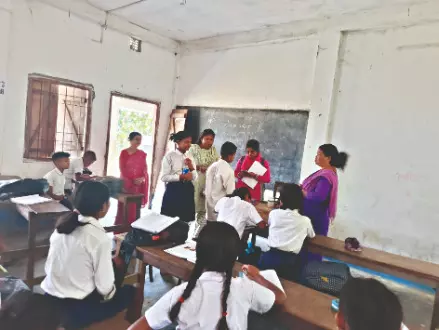Elephantiasis cases surge: 50 detected in Jalpaiguri & Alipurduar

Jalpaiguri: In a joint survey conducted by the Tribal Development department and the Health department, 50 cases of elephantiasis—a debilitating parasitic disease—have been identified in tea garden and forest fringe areas of Jalpaiguri and Alipurduar districts. The findings have sparked urgent awareness and medical intervention drives across the affected tribal communities.
The West Bengal Tribal Development Cooperative Corporation Limited (WBTDCCL), in collaboration with the Health department, has launched extensive door-to-door surveys, awareness campaigns and health camps, particularly in remote settlements of the Dooars region, which stretches from the Himalayan foothills through North Bengal. Awareness sessions are targeting tribal men, women and school children to help curb the spread of the disease. “During the recent survey, patients were found with severely swollen limbs resembling the legs of an elephant—some even with open wounds leaking blood and pus,” said Ashok Kumar Modak, Regional Manager of WBTDCCL. “Treatment has already begun in the affected tea garden and forest areas of Jalpaiguri and Alipurduar.”
So far, nearly 5,700 people have been reached through awareness campaigns, Modak added. “We are working to ensure that all identified patients receive treatment through proper government channels.” Elephantiasis—also known as lymphatic filariasis—is caused by parasitic worms transmitted by Culex mosquitoes, which breed in stagnant and unhygienic water.
The infection blocks lymphatic vessels, causing swelling of limbs and sometimes hydrocele. In some cases, surgical intervention has been necessary. The disease can persist in the human body for up to 5 to 7 years, and although no vaccine exists, medications are being administered to build immunity, officials said.
According to the Health department, affected areas in Alipurduar include Dimdima, Ramjhora, Marakhata, Raimatang, Rajabhatkhawa, Mujnai, Fokadanga, Khoyardnaga, Panijhora and Mathura. In Jalpaiguri, cases have been detected in Shaljhora Hat, Angrabhasa, Nagrakata, Meteli, Kalabari, Gairkata and Banarhat. Dr Asim Haldar, Chief Medical Officer of Health (CMOH), Jalpaiguri, confirmed that the disease has spread across tea garden belts under Mal, Kranti, Banarhat, Meteli, Nagrakata, and Dhupguri blocks.
“The disease is causing long-term physical disabilities. We have conducted surgeries for hydrocele and advised mosquito-bite prevention measures,” he said. According to the World Health Organisation (WHO), over 657 million people in 39 countries are still at risk of lymphatic filariasis, underlining the need for sustained public health vigilance.



